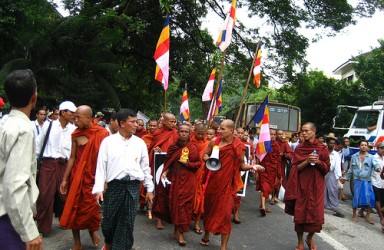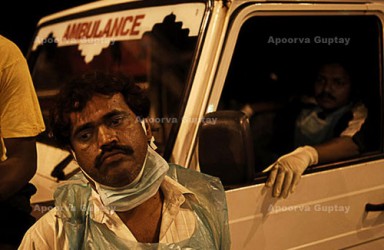The Conflict in Sri Lanka and the Responsibility to Protect
In mid 2008, the Sri Lankan government began a military offensive against LTTE rebels. Civilians trapped by the fighting face a double peril: if they flee, they risk being killed by the LTTE; if they stay, they must face the government’s bombardment. All this has prompted some humanitarian advocates to invoke the ‘Responsibility to Protect’ (RtoP) principle. Are they right to do so?
Sri Lanka Needs Peace, Not R2P
Proponents of “responsibility to protect” or “R2P” have been linking their concept in recent weeks to the waning civil war in Sri Lanka. Are they right to do so? Talk of R2P may well distract from what should be a clear and unified demand to both sides: Cease fire.
Burma’s Crimes Against Humanity – A Test Case for the ‘Responsibility to Protect’
Burma is ruled by one of the world’s most brutal military regimes, guilty of every possible human rights violation. Known as the State Peace and Development Council (SPDC) and led by Senior General Than Shwe, Burma’s junta is not only brutal, but illegitimate. Elections held in 1990 were overwhelmingly won by the National League for Democracy (NLD) led by Nobel Laureate Aung San Suu Kyi. The world has an undoubted responsibility to protect the Burmese people from their leaders.
Mumbai Terrorist Attacks – A Question of Governance
The slaughter of civilians in Mumbai by terrorists in November 2008 has once again vitiated the relationship between India and Pakistan in what is the fourth major crisis between them since the two countries became nuclear powers in the late 1980s.
Is Humanitarian Intervention Legal?
Where collective security avenues are blocked, could a State, or States acting jointly, lawfully intervene militarily in another State’s territory without the permission of the Government of that State to halt or prevent it from committing atrocities against its own people? What about intervention where the territorial Government is unable or unwilling to provide basic humanitarian assistance to its people in the face of natural or human-made disaster?
The Zimbabwe Crisis and R2P
The political and humanitarian situation in Zimbabwe continues to cause great concern. This article considers whether R2P offers a framework for a national and, if necessary, an international response to the crisis. It is argued the UN has other diplomatic tools which could be more effective at this stage.
Fixing War Powers and Constraining Presidential Power?
Last week, the National War Powers Commission published its report on how to fix war powers. The Commission notes that the War Powers Resolution of 1973 has been monumentally ineffective at resolving fundamental questions — both constitutional and political — of war powers.
Burma and the responsibility to protect: first, do more good than harm
Paranoid and mistrustful of the outside world, Burma’s generals were criminally tardy in permitting emergency humanitarian supplies and personnel to come into the country after a devastating cyclone in early May. Yet attempts to invoke R2P were ill advised.
China, Darfur, and the 2008 Summer Olympics: An Intolerable Contradiction
Despite the common claim that China can’t be moved by international pressure from human rights or advocacy groups, the campaign to link genocide in Darfur to Beijing’s hosting of the 2008 Summer Olympic Games has thoroughly belied this notion. It is a campaign which must not give way to political expediency.
Water Security in the 21st Century
The total quantity of water in the world is immense, but over 97.5 percent, is either saltwater or locked in ice caps (1.75%). The amount economically available for human use is only 0.007 percent of the total water available on earth, or about 13,500 cubic kilometres. While this seems like a massive amount, it only accounts to about 2300 cubic meters per person per year a 37 percent drop since 1970. Both water quantity, quality, and distribution have been neglected to the point of nearing a worldwide catastrophe.







